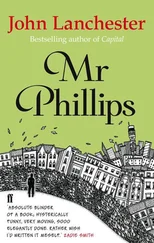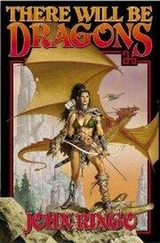He stopped moving the pieces around and took the three ships away. The single piece – the hermit himself – was still in the middle of the box. Then he brought another piece of paper to the edge of the box and left it there for a few seconds. He moved it very slightly and left it again. And again. He kept doing this. I got it: a vessel approaching the installation, but slowly, very slowly. It took at least a couple of minutes for the boat to get to the platform. The boat was moving so slowly that it had to be under sail or oar – and that’s when it came to me: this must be the story of how he had seen us coming and what he had decided to do. This was us rowing towards the platform.
Our boat got to the middle of the box, right next to the hermit. He left it there and folded his arms. He had seen us coming, he had seen us arrive, and then he had thought about what to do next. He looked at the pieces on the board, then picked them up and put them down beside the box, and then he looked at us, as if to say: and now here we are.
‘Why us?’ Hifa asked, her voice soft.
He seemed not to be listening, but after a few seconds, he held up two fingers. The answer appeared to be, because there were only two of us.
‘Thank you,’ said Hifa. The man gave a circular movement of his head which I took to mean something along the lines of ‘Don’t mention it’.
‘Thank you,’ I said. It was nowhere near a large enough statement for what I felt, but what else was there to say?
‘We’re going to go upstairs,’ I said. ‘I hope that’s OK.’ Again he showed no reaction, but there was something about his non-reaction which was a form of ‘yes’. Yes-stillness was different from no-stillness. This was going to take some getting used to as a form of communication, learning a new non-language.
I went up the ladder first this time. There was just enough light. I went first to ‘our’ room to check that it was all as we had left it. Hifa came in behind me and sat on one of the mattresses. I knew that I should eat but I felt too tired. I knew what I wanted instead: light. I went to see if there was another one of those oil lanterns. There didn’t seem to be one in any of the other rooms on this floor, except the hermit’s, and I couldn’t take that. By now the sun had gone down. The ladder was the darkest point of the building, in the centre away from the windows, and I went down very carefully. The hermit was still in the same corner, but looking out the windows in the direction where the sun had set. Past him I could see the first stars.
‘I’m on the hunt for one of those lanterns,’ I said, ‘with your permission. It’s been such a long time.’
There was a pause of a few seconds. I think it was still so strange to him hearing human speech again that it was taking him a while to process what he heard. He pointed at a far corner of the room. That was a huge moment, the first gesture he had made that didn’t involve his cardboard stage set. I picked my way through the stacked and teetering supplies and found, sitting on top of a crate, an oil lantern, identical to the one I had seen upstairs in his room. Next to it, just as miraculous, was a box of matches. It occurred to me that the matches were as valuable as the oil. I turned to look at him and, with the starlight behind him and the moonlight pouring across the windows in front, he made a double-handed gesture which clearly meant: go, take it.
I went back up to Hifa. She was still sitting on the mattress. I showed her my bounty, my booty, my plunder, my gift. She scooched over on the mattress and I sat next to her. My hand shaking – I was nervous, now that it had dawned on me how precious the matches were – I opened the window of the lantern, turned the tiny tap for the oil supply, and struck a match. Its flare of light was the most extraordinary thing I had seen in a long time. I touched it to the wick and the lantern came into life. The light was yellow-blue, gold, the most beautiful thing I had ever seen. I bent forwards and put the lantern down on a chair at the end of the bed. The light was flickering but reliable, the most cinematic and biggest sight. I sat down next to Hifa and we watched the light for many minutes.
‘We can bring the supplies up tomorrow,’ I eventually said.
‘I’ll set out lines.’
‘He’ll withdraw the ladder. Maybe he already has.’
‘But we’ll leave the lifeboat there. You never know.’
‘You never know.’
We were silent again for a long while.
‘I didn’t actually want to Breed,’ said Hifa. ‘It was more about wanting sex. And wanting to get off the Wall. I got tired of waiting, I thought you’d never ask.’
Did I believe her? I’m not sure. Jokes ran through my mind: I thought about saying, I know, or You did the right thing, or Now she tells me. Instead I just squeezed her arm. I thought, I could watch this light forever, I will never tire of watching this light, this light is the best thing I have ever seen. My arms and back hurt, I was tired and hungry, I was, when I thought about it, dehydrated, with a dry mouth and a nasty headache, but I didn’t care about any of that, all I wanted to do was sit on the bed and watch the lantern.
‘Tell me a story,’ said Hifa.
I tried to think of one. ‘Everything is going to be all right,’ I said, that’s what a story is, something where everything turns out all right, but I said that and I could see it wasn’t what she wanted to hear. That is another thing a story is, something somebody wants to hear, but my mind was blank and all I could think was, she wants me to tell her a story, a story where something turns out all right. I said this to myself over and over again, that’s what a story is, something that turns out all right, and then it came to me, and what I said out loud began like this: ‘It’s cold on the Wall.’
John Lanchester has written four novels, The Debt to Pleasure, Mr Phillips, Fragrant Harbour and Capital , and three works of non-fiction: Family Romance , a memoir; Whoops!: Why everyone owes everyone and no one can pay , about the global financial crisis; and How to Speak Money , a primer in popular economics. His books have won the Hawthornden Prize, the Whitbread First Novel Prize, the E. M. Forster Award, and the Premi Llibreter, been longlisted for the Booker Prize, and been translated into twenty-five languages. He is a contributing editor to the London Review of Books and a regular contributor to the New Yorker .
fiction
THE DEBT TO PLEASURE
MR PHILLIPS
FRAGRANT HARBOUR
CAPITAL
non-fiction
FAMILY ROMANCE
WHOOPS! WHY EVERYONE OWES EVERYONE AND NO ONE CAN PAY
WHAT WE TALK ABOUT WHEN WE TALK ABOUT THE TUBE
HOW TO SPEAK MONEY












